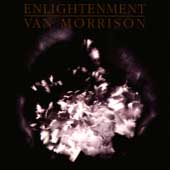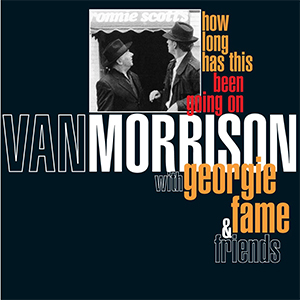Related Research Articles

Moondance is the third studio album by Northern Irish singer-songwriter Van Morrison. It was released on 27 January 1970 by Warner Bros. Records. After the commercial failure of his first Warner Bros. album Astral Weeks (1968), Morrison moved to upstate New York with his wife and began writing songs for Moondance. There, he met the musicians that would record the album with him at New York City's A & R Studios in August and September 1969.

Veedon Fleece is the eighth studio album by Northern Irish singer-songwriter Van Morrison, released in October 1974. Morrison recorded the album shortly after his divorce from wife Janet (Planet) Rigsbee. With his broken marriage in the past, Morrison visited Ireland on holiday for new inspiration, arriving on 20 October 1973. While there he wrote, in less than three weeks, the songs included on the album.

Hard Nose the Highway is the seventh studio album by Northern Irish singer-songwriter Van Morrison, released in 1973. It is his first solo album since his 1967 debut Blowin' Your Mind! to contain songs not written by Morrison. A cover version of the song "Bein' Green", usually associated with Kermit the Frog, is included, as is a take of the traditional song "Purple Heather". The album also contains the single "Warm Love," a fan favourite.

A Period of Transition is the ninth studio album by Northern Irish singer-songwriter Van Morrison, released in 1977. It was his first album in two-and-a-half years. At the time of its release it was received with some disappointment by critics and fans: "Most were hoping for a work of primeval vocal aggression that would challenge the emerging élite of Morrison pretenders, whose ranks included Bruce Springsteen, Bob Seger, Phil Lynott, Graham Parker and Elvis Costello." However, the album is still notable for several major compositions, including "Heavy Connection", "Flamingos Fly", "The Eternal Kansas City" and "Cold Wind in August".

Too Long in Exile is the twenty-second studio album by Northern Irish singer-songwriter Van Morrison. The album was produced by Morrison and draws on urban blues and soul jazz sounds, including collaborations with John Lee Hooker and Georgie Fame. Released in 1993 by Polydor Records, Too Long in Exile received positive reviews from most critics and reached #4 on the UK Albums Chart. It reached #29 in the US, Van Morrison's highest ranking since 1978's Wavelength (#28) and until 1999's Back on Top (#28).

Enlightenment is the twentieth studio album by Northern Irish singer-songwriter Van Morrison. It was released in 1990 and reached No. 5 in the UK charts and "Real Real Gone" charted at No. 18 in Mainstream Rock Tracks.

How Long Has This Been Going On is the twenty-fourth studio album by Northern Irish singer-songwriter Van Morrison, "with Georgie Fame and Friends", released in December 1995 in the UK. It charted at No. 1 on Top Jazz Albums.
"Into the Mystic" is a song written by Northern Irish singer-songwriter Van Morrison and featured on his 1970 album Moondance. It was also included on Morrison's 1974 live album, It's Too Late to Stop Now.

"Moondance" is a song recorded by Northern Irish singer and songwriter Van Morrison and is the title song on his third studio album Moondance (1970). It was written by Morrison, and produced by Morrison and Lewis Merenstein.
"Caravan" is a song written by Northern Irish singer-songwriter Van Morrison and included on his 1970 album, Moondance. It was a concert highlight for several years and was included as one of the songs on Morrison's 1974 acclaimed live album, It's Too Late to Stop Now.
"And It Stoned Me" is a song by Northern Irish singer-songwriter Van Morrison. It is the opening track on his 1970 solo album, Moondance.
"Saint Dominic's Preview" is the title song of the sixth album by Northern Irish singer-songwriter Van Morrison, released in July 1972 by Warner Bros. It was recorded at the Wally Heider Studios in San Francisco in April 1972, with overdubs made later on. Morrison wrote it in a stream of consciousness in the same vein as some of his earlier works, particularly those on Astral Weeks. The song's narrative moves from France to San Francisco, Morrison's place of residence at the time, to Belfast, where he grew up, to New York City.
"Slim Slow Slider" is the closing track on the 1968 album Astral Weeks by Northern Irish singer-songwriter Van Morrison.

"The Healing Game" is the title song on Northern Irish singer-songwriter Van Morrison's 1997 album. It was released twice as a single in 1997 as an A-side with different B-sides – including "Have I Told You Lately" and "Gloria". The single reached number 46 in the UK.

Van Morrison in Ireland is the first official video by Northern Irish singer-songwriter Van Morrison, released in 1981 of a concert Morrison recorded in Northern Ireland in 1979. It was directed by Michael Radford who later became a noted filmmaker. The video includes footage of the band whilst touring in Ireland and images of Belfast, including Hyndford Street and Cyprus Avenue. Tony Stewart of the NME states, "The band display a range of textures reminiscent of The Caledonia Soul Orchestra, first with the dark resonance of Toni Marcus' violin, then Pat Kyle's bright sharp tenor sax and finally Bobby Tench's prickly electric guitar".
"Brand New Day" is a song written by Northern Irish singer-songwriter Van Morrison and featured on his 1970 album Moondance.

"Come Running" is a song written by singer-songwriter Van Morrison and included on his 1970 album Moondance.
"I've Been Working" is a song written by Northern Irish singer-songwriter Van Morrison appearing on the album His Band and the Street Choir, released in 1970. The song was first an outtake from Morrison's well received album Astral Weeks of 1968. Other versions of "I've Been Working" were recorded for Morrison's next album Moondance, of which, three were released on the 2013 deluxe edition.
"These Dreams of You" is a song written by the Northern Irish singer-songwriter Van Morrison on his 1970 album Moondance. It was also included on his 1974 live album, It's Too Late to Stop Now.

"Call Me Up in Dreamland" is a song that was written by Northern Irish singer-songwriter, Van Morrison and included on his 1970 album, His Band and the Street Choir. Brian Hinton describes the song as "life on the road, with 'radio' as a verb and laughing sax."
References
- Hinton, Brian (1997). Celtic Crossroads: The Art of Van Morrison, Sanctuary, ISBN 1-86074-169-X